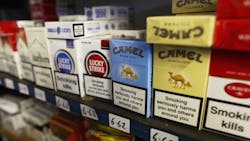British American Tobacco Wins Reynolds with Sweetened Bid
British American Tobacco Plc (IW 1000/201) reached agreement to buy full control of Reynolds American Inc. with a sweetened $49.4 billion offer, bringing a successful end to almost three months of bartering with the maker of Camel cigarettes.
BAT increased the cash element of a cash-and-share bid for the 58% of Reynolds that it doesn’t already own. The new offer values each Reynolds share at $59.64, the London-based company said Tuesday, about 5.6% more than the $56.50 it proposed on Oct. 21.
Hammering out the terms of an improved deal has been a slow process for the cigarette makers, complicated by uncertainty created by Donald Trump’s election. With agreement in place, the companies can move forward with a combination that marks the latest stage in a wave of consolidation for the tobacco industry, which is struggling with shrinking demand for traditional cigarettes and an uncertain pathway to new, potentially less harmful technologies.
“The market will be relieved that they have got the deal over the line,” said Richard Marwood, a fund manager at Royal London Asset Management whose assets include BAT shares. “People were starting to worry that the negotiations might break down.”
BAT shares were little changed at 4,752.5 pence at 9:55 a.m. in London. Reynolds shares rose 4% to $58.20 in New York pre-market trading.
The U.K. company said it's offering $29.44 in cash and 0.526 of a BAT share for each Reynolds share, pushing the cash element up from $24.13. The increase partly reflects a drop in the sterling-dollar rate since BAT made its initial proposal, said Chris Wickham, an analyst at Whitman Howard Ltd.
Analysts have said a possible corporate tax cut by President-elect Trump would also justify an increase in the bid, although BAT denied that played any role.
“BAT shareholders will be the happier of the two groups because they will be getting the potential benefits from a lower corporate tax rate,” said James Bushnell, an analyst at Exane BNP Paribas.
Uncertainty over the tax rate is reflected in a breakup fee of $1 billion should either side pull out of the deal, Bushnell said. The transaction requires the approval of at least 50% of Reynolds shareholders in a vote that will exclude BAT.
BAT estimated that the transaction would create cost synergies of about $400 million. The U.K. company has gained confidence in that target and would hope to exceed it, Chief Financial Officer Ben Stevens said on a conference call.
Combined, the two companies would overtake Philip Morris International Inc., the maker of Marlboro, as the world’s largest publicly traded tobacco company by revenue. It would give the U.K. company an initial foothold in the U.S., which will account for about 35% of the combined group’s revenue, according to Bloomberg data. BAT will also gain access to Reynolds’s leading electronic-cigarette position including the Vuse brand.
The combination could herald more tobacco-industry deals. Japan Tobacco Inc. buying Britain’s Imperial Brands Plc, and Philip Morris International Inc. re-merging with Altria Group Inc. eight years after splitting are the most plausible scenarios, experts say.
BAT said a committee of independent Reynolds directors unanimously approved the offer, which will boost the U.K. company’s earnings per share in the first year after completion. The British company has held a stake in Winston-Salem, N.C.-based Reynolds since the U.S. company was created in 2004, and the two tobacco giants are close partners on vapor technology innovation.
By Thomas Mulier and Sam Chambers
About the Author
Bloomberg
Licensed content from Bloomberg, copyright 2016.
